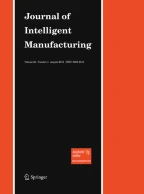Abstract
This paper addresses the implementation of a web-based manufacturing process aid (WMPA) system to improve the quality of products in the electronic assembly shop floor by accelerating assemblers’ training and products’ revision progress. In the design of experiments, traditional paper-based MPA instructions are compared to the WMPA system in terms of total assembly time, the learning curve, and the number of assembly mistakes. For the novices’ group, the experimental results indicate that the WMPA system can be an efficient training tool that shortens the learning curve and improves assembly accuracy by 74 and 42 %, respectively for two independent products. There is no obvious difference for the mean assembly time during first product production. However, 3.6 % improvement for the assembly time during the comparatively complicate product is observed.
Similar content being viewed by others
References
Balazinski, M., & Przybylo, A. (2005). Teaching manufacturing processes using computer animation. Journal of Manufacturing Systems, 24(3), 237–243.
Bengu, G., & Swart, W. (1996). A computer-aided, total quality approach to manufacturing education in engineering. IEEE Transactions on Education, 39(3), 415–422.
Bhatti, A., Nahavandi, S., Khoo, Y. B., Creighton, D., Anticev, J., & Zhou, M. (2009). Haptically enabled interactive virtual assembly training system development and evaluation. In SIMTECT 2009: Proceedings of the 2009 International Design Engineering Technical Conferences and Computers and Information in Engineering Conference, Adelaide, South Australia (pp. 1–6).
Bidanda, B., Ariyawongrat, P., Needy, K. L., Norman, B. A., & Tharmmaphornphilas, W. (2005). Human related issues in manufacturing cell design, implementation, and operation: A review and survey. Computers and Industrial Engineering, 48(3), 507–523.
Büyüközkan, G., Baykasoğlu, A., & Dereli, T. (2007). Integration of Internet and web-based tools in new product development process. Production Planning and Control, 18(1), 44–53.
Chang, C., & Chen, Y. (1995). A study of multimedia application in education and training. Computers and Industrial Engineering, 29(1–4), 103–107.
Chen, K.-Z., Feng, X.-A., & Ding, L. (2002). Intelligent approaches for generating assembly drawings from 3-D computer models of mechanical products. Computer-Aided Design, 34(5), 347–355.
Gunasekaran, A., & Love, P. E. D. (1999). A review of multimedia technology in manufacturing. Computers in Industry, 38(1), 65–76.
Gunasekaran, A., Bignall, R. J., & Rahman, S. M. (1996). Multimedia in manufacturing. Production Planning and Control, 7(5), 440–451.
Hill, S. (1995). Lights, camera, no action. Manufacturing Systems, 13(2), 6–7.
Horenstein, M. N. (2009). Design concepts for engineers. Englewood Cliffs, NJ: Prentice-Hall.
Khouja, M. (2000). The economic lot and delivery scheduling problem: Common cycle, rework, and variable production rate. IIE Transactions, 32(8), 715–725.
Lu, X., Qi, Y., Zhou, T., & Yao, X. (2012). Constraint-based virtual assembly training system for aircraft engine. Advances in Computational Environment Science, 142, 105–112.
Lan, H. (2009). Web-based rapid prototyping and manufacturing systems: A review. Computers in Industry, 60(9), 643–656.
Martin, B., Koedinger, K., Mitrovic, T., & Mathan, S. (2005). On using learning curves to evaluate ITS. In Proceedings of the Twelfth International Conference on Artificial Intelligence in Education, Amsterdam, Netherlands (pp. 419–426).
Mayer, R. E., & Moreno, R. (2002). Aids to computer-based multimedia learning. Learning and Instruction, 12(1), 107–119.
Mayer, R. E., & Moreno, R. (2002). Animation as an aid to multimedia learning. Educational Psychology Review, 14(1), 87–99.
Mayer, R. E. (2003). The promise of multimedia learning: Using the same instructional design methods across different media. Learning and Instruction, 13(2), 125–139.
Newell, A., & Rosenbloom, P. S. (1981). Mechanisms of skill acquisition and the law of practice. In J. R. Anderson (Ed.), Cognitive skills and their acquisition. Hillsdale, NJ: Lawrence Erlbaum Associates.
Rahman, S. M., Sarker, R., & Bignall, B. (1999). Application of multimedia technology in manufacturing: A review. Computers in Industry, 38(1), 43–52.
Rolstadas, A. (1995). Multimedia and training. Production Planning and Control, 6(4), 285.
Velasquez, J. D., Yoon, S. W., & Nof, S. Y. (2010). Computer-based collaborative training for transportation security and emergency response. Computers in Industry, 61(4), 380–389.
Wang, L., Orban, P., Cunningham, A., & Lang, S. (2004). Remote real-time CNC machining for web-based manufacturing. Robotics and Computer-Integrated Manufacturing, 20(6), 563–571.
Yang, H., & Xue, D. (2003). Recent research on developing Web-based manufacturing systems: A review. International Journal of Production Research, 41(15), 3601–3629.
Yoon, S. W., Velasquez, J. D., Partridge, B. K., & Nof, S. Y. (2008). Transportation security decision support system for emergency response: A training prototype. Decision Support Systems, 46(1), 139–148.
Zhai, E., Shi, Y., & Gregory, M. (2007). The growth and capability development of electronics manufacturing service (EMS) companies. International Journal of Production Economics, 107(1), 1–19.
Acknowledgments
This research was funded by the Watson Institute for Systems Excellence at State University of New York at Binghamton and Sanmina-SCI Corporation at Manchester, New Hampshire, USA. The authors thank Leonard J. Poch and David Hager for help with project implementation.
Author information
Authors and Affiliations
Corresponding author
Rights and permissions
About this article
Cite this article
Li, D., Raghavan, V. & Yoon, S.W. Implementation of web-based manufacturing process aid in the electronic assembly shop floor. J Intell Manuf 26, 1281–1290 (2015). https://doi.org/10.1007/s10845-013-0861-8
Received:
Accepted:
Published:
Issue Date:
DOI: https://doi.org/10.1007/s10845-013-0861-8
